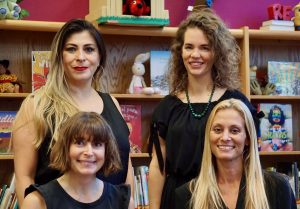There isn’t just one indicator that determines whether your child is ready for kindergarten. Experts agree that a child’s development needs to be evaluated in several areas.
Some school districts use assessment tests to determine kindergarten readiness. Children are asked questions to test their cognitive abilities. They might also be asked to perform tasks such as drawing shapes and sorting objects. Experts advise parents not to make a decision based entirely on test results, but to consider observations by teachers, pediatricians and parents.
The following is a guideline that includes a range of social, academic and developmental factors to consider when deciding if your child is ready to enter school:
- Enthusiasm toward learning. Is he eager to explore and discover? Is he comfortable asking questions? Does he persist even when a task is difficult?
- Language skills. Does she communicate her needs? Express her feelings appropriately?
- Ability to listen. Can he follow simple instructions? Is he able to listen to an entire story without interrupting?
- Desire to be independent. Does she separate from parents for the school day? Is she starting to take responsibility for her personal belongings? Can she follow simple two-step tasks? Can she use the bathroom by herself?
- Ability to interact with children and adults. Is he able to share, compromise, take turns and problem-solve?
- Strong fine-motor skills. Is she able to hold and use a pencil? Cut with scissors? Is she learning to write her name?
- Basic letter and number awareness. Can he sing and recite the alphabet and recognize some letters? Can he count to 10 and identify numbers one to five?
Get advice and observe
- Speak with your child’s preschool teacher. If your child has attended preschool, talk to her teacher. As an educator, she will have a good idea of how your child compares to other children at the same grade level and whether she thinks she is ready or not.
- Speak with your child’s pediatrician. Your child’s doctor will be aware of your child’s physical and developmental maturity and will be able to offer his expert opinion.
- Visit pre-k and kindergarten classes. Spend some time visiting both a kindergarten and a pre-k class. Does the teacher focus on writing and phonics, or is the curriculum based on hands-on activities? Look for a setting that would best fit your child’s personality, temperament and abilities.
How parents can help
One of the very best ways parents can prepare their children for kindergarten is by reading to them again and again. Reading to them helps them develop the language skills needed for reading. And don’t ignore the importance of learning social skills by providing opportunities for children to interact in small and large groups.
Here are some additional tips from Pennsylvania’s 2005 Teacher of the Year, Nikki Salvatico:
- Set up playtimes on the school playground, especially with some of the other children entering the kindergarten program. This will establish an automatic support system.
- Take a tour of the new school. Often a principal or assistant principal will guide the tour, and this helps to familiarize your child with the various places in the school such as the library, classroom, and nurse’s office.
- Create a routine at home to help your child get oriented to following directions and helping with transitioning to the school routine.
- Give your child developmentally appropriate chores at home, and hold him accountable for doing them. These types of activities will automatically transfer over into the classroom and help your child to feel successful and comfortable.
Parents know best
For every parent grappling with this issue, remember that you know your child better than anyone else does. You are his first and most important teacher, and ultimately you will know what is best for your child.
 Welcome to Kindergarten!
Welcome to Kindergarten!